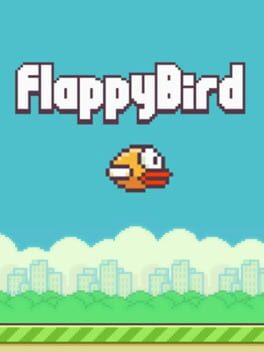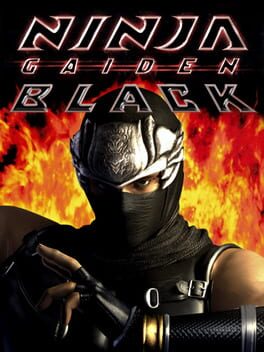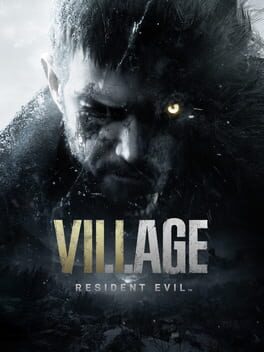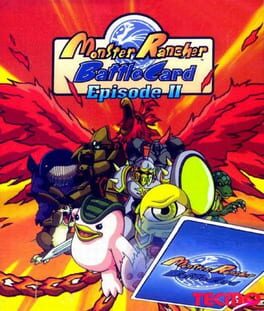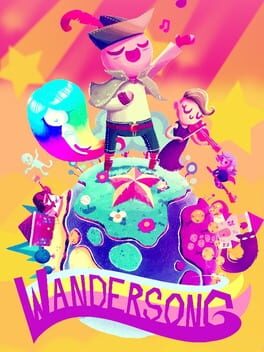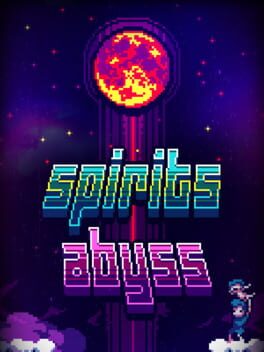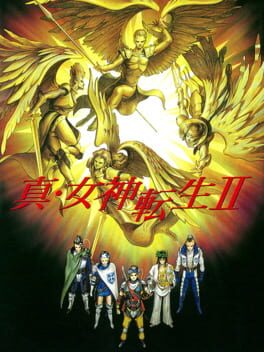NovusatNite
13 reviews liked by NovusatNite
Flappy Bird
2013
Ninja Gaiden Black
2005
Cyberpunk 2077
2020
Cyberpunk 2077
2020
Wandersong
2018
While Wandersong begins with pitch-perfect puzzles and story beats, its writing quickly becomes quite one-note, and the dragging coda will likely dissuade players from enjoying repeat performances.
Wandersong is the story of a young bard whose mission, in the face of a looming apocalypse, is to gather the pieces of the mythical Eversong, the united musical intonations of all the living, to repel disaster. The bard is joined by Miriam, a cynical but talented witch, and they visit a great many locales filled with unique denizens to seek out the keepers of the pieces of the Eversong, the Overseers.
Early on, it is established that the bard is not the hero of this tale—that would be The Hero, who wields a sword that shoots lightning and wishes to kill the Overseers to accelerate the end of the world and the creation of the next. The bard and Miriam pursue their mission peacefully, with the bard’s musical stylings the key to their success (reflecting the game itself, which with a couple notable exceptions, excels most in its choonz), whether it’s in convincing townspeople or animals to help them or by generating magical spells.
Thus, the game has a very simple subversion as the core of its gameplay and narrative. While the concept of the traditional video game hero as a raging murderous psychopath and the player’s insertion into an unbecoming, non-traditional hero isn’t new, the game uses it well enough for the opening hours. The bard and Miriam are likeable enough characters and play off each other well. You really get to share the bard’s stupid optimism and distrust of The Hero. And then it’s fun to suddenly find yourself playing as The Hero for a brief section, playing a serviceable action platformer.
As the bard, you will constantly be met with pastiche of different genres. While you’re basically always playing a puzzle platformer, some towns will have light life sim elements with day/night cycles or require small fetch quests or play more like a narrative-focused “walking sim” like Night in the Woods. The dungeons, if you can call them that, always have a new singing-controlled gimmick. Boss fights and Act-ending puzzles (used to actually learn the Earthsong) are varied enough to stay fresh, and when they work, they work well. The gameplay never gets particularly interesting, but the novelty is entertaining enough for a while.
What’s really going to make or break the game for you is if you enjoy its writing. While, like all things in Wandersong, it starts off delightful, a nagging sensation begins to form as you get deeper into the story. The problem for me is this: every single character speaks in exactly the same voice. For a game like Wandersong, where a large part of the appeal is in charming dialogue and character writing, it’s a huge issue when everyone sounds like a standard online millennial. Every single character has the same obnoxious, vaguely sarcastic way of interacting with one another. When it comes time for a character’s arc to develop, no matter what the character’s troubles or ostensible personality traits, they become unbelievably emotionally intelligent and open. I can certainly understand and appreciate that the bard is a wonderful, charming force for good in the world, but these kinds of characters typically need foils, and even the gruffest and rudest denizens of one of the half dozen or so locales the player visits talks in the same, y’know, um… voice. I certainly would never ask a game with the charm and optimistic aim of Wandersong to create emotionally ambiguous resolutions for its characters, but having the characters be characters instead of vehicles for snappy dialogue and repetitive themes about accepting themselves would be greatly appreciated. While the character designs are lovely, and I admire the ambition of creating a great ensemble cast the player would become invested in for the grand resolution, simplifying the game to include fewer characters might have helped to add to the variety of proceedings and allowed some time for characters and their arcs to breathe. By the end of the game, I found myself completely disinterested in hearing the same fucking tone of voice from another town full of people and trying to keep it down when it was force-fed to me during required story interactions contained to the main few characters.
The gameplay similarly sees the wheels fly off by the end of the game. The challenge never develops at all, and instead puzzles just cycle through new gimmicks. This is perfectly fine, but just as a mechanic seems to feel like it’s working and producing some interesting gameplay, the game cuts it off. So you’re constantly teased with fun scenarios with new abilities, just to have them ripped away for an exhausting stretch of dialogue before you move on to the next puzzle gimmick that will be completely under-utilized for a good 75% of the time you’re using it. The ending stretch doesn’t even feature fun gimmicks to begin with and often feel like tedious, simplistic slogs. It’s in these moments, where you’re sitting there doing something stupidly simple, that the little quirks start to feel extremely irritating.
My performance in the game is not really impacted by my ability to keep up with a piece of music or gameplay (the worst penalty is moving back about twenty seconds in a boss encounter at absolute worst), but I’d like to hear this song properly or react to this boss quickly (mostly so I can get one of Wandersong’s horrible boss battles over with faster). Why, oh why, does Wandersong’s metronome feature for pointing out which direction to mash your right analog stick not function like any other rhythm game ever? And why did they put dead zones between the eight input directions of the controller when your stick is resting at center? I’m not playing this on the GameCube. I’m not gonna be able to switch from one side to another (through dead center, always, for boss battles) with pinpoint accuracy if you make the dead zones show up when they’re most cumbersome!
Honestly, if Wandersong were a bit tighter, trimming off some of the more redundant areas to make a solid, say, four-act story with varied and interesting characters, these gripes about the mechanics and dialogue would probably be much more minor. But subjecting myself to seven hours of this felt like complete misery by the end. And for those of you who have finished the game, I’ll just let you imagine how red my face was as I played through that endless, tuneless epilogue cutscene… twice…
Wandersong is the story of a young bard whose mission, in the face of a looming apocalypse, is to gather the pieces of the mythical Eversong, the united musical intonations of all the living, to repel disaster. The bard is joined by Miriam, a cynical but talented witch, and they visit a great many locales filled with unique denizens to seek out the keepers of the pieces of the Eversong, the Overseers.
Early on, it is established that the bard is not the hero of this tale—that would be The Hero, who wields a sword that shoots lightning and wishes to kill the Overseers to accelerate the end of the world and the creation of the next. The bard and Miriam pursue their mission peacefully, with the bard’s musical stylings the key to their success (reflecting the game itself, which with a couple notable exceptions, excels most in its choonz), whether it’s in convincing townspeople or animals to help them or by generating magical spells.
Thus, the game has a very simple subversion as the core of its gameplay and narrative. While the concept of the traditional video game hero as a raging murderous psychopath and the player’s insertion into an unbecoming, non-traditional hero isn’t new, the game uses it well enough for the opening hours. The bard and Miriam are likeable enough characters and play off each other well. You really get to share the bard’s stupid optimism and distrust of The Hero. And then it’s fun to suddenly find yourself playing as The Hero for a brief section, playing a serviceable action platformer.
As the bard, you will constantly be met with pastiche of different genres. While you’re basically always playing a puzzle platformer, some towns will have light life sim elements with day/night cycles or require small fetch quests or play more like a narrative-focused “walking sim” like Night in the Woods. The dungeons, if you can call them that, always have a new singing-controlled gimmick. Boss fights and Act-ending puzzles (used to actually learn the Earthsong) are varied enough to stay fresh, and when they work, they work well. The gameplay never gets particularly interesting, but the novelty is entertaining enough for a while.
What’s really going to make or break the game for you is if you enjoy its writing. While, like all things in Wandersong, it starts off delightful, a nagging sensation begins to form as you get deeper into the story. The problem for me is this: every single character speaks in exactly the same voice. For a game like Wandersong, where a large part of the appeal is in charming dialogue and character writing, it’s a huge issue when everyone sounds like a standard online millennial. Every single character has the same obnoxious, vaguely sarcastic way of interacting with one another. When it comes time for a character’s arc to develop, no matter what the character’s troubles or ostensible personality traits, they become unbelievably emotionally intelligent and open. I can certainly understand and appreciate that the bard is a wonderful, charming force for good in the world, but these kinds of characters typically need foils, and even the gruffest and rudest denizens of one of the half dozen or so locales the player visits talks in the same, y’know, um… voice. I certainly would never ask a game with the charm and optimistic aim of Wandersong to create emotionally ambiguous resolutions for its characters, but having the characters be characters instead of vehicles for snappy dialogue and repetitive themes about accepting themselves would be greatly appreciated. While the character designs are lovely, and I admire the ambition of creating a great ensemble cast the player would become invested in for the grand resolution, simplifying the game to include fewer characters might have helped to add to the variety of proceedings and allowed some time for characters and their arcs to breathe. By the end of the game, I found myself completely disinterested in hearing the same fucking tone of voice from another town full of people and trying to keep it down when it was force-fed to me during required story interactions contained to the main few characters.
The gameplay similarly sees the wheels fly off by the end of the game. The challenge never develops at all, and instead puzzles just cycle through new gimmicks. This is perfectly fine, but just as a mechanic seems to feel like it’s working and producing some interesting gameplay, the game cuts it off. So you’re constantly teased with fun scenarios with new abilities, just to have them ripped away for an exhausting stretch of dialogue before you move on to the next puzzle gimmick that will be completely under-utilized for a good 75% of the time you’re using it. The ending stretch doesn’t even feature fun gimmicks to begin with and often feel like tedious, simplistic slogs. It’s in these moments, where you’re sitting there doing something stupidly simple, that the little quirks start to feel extremely irritating.
My performance in the game is not really impacted by my ability to keep up with a piece of music or gameplay (the worst penalty is moving back about twenty seconds in a boss encounter at absolute worst), but I’d like to hear this song properly or react to this boss quickly (mostly so I can get one of Wandersong’s horrible boss battles over with faster). Why, oh why, does Wandersong’s metronome feature for pointing out which direction to mash your right analog stick not function like any other rhythm game ever? And why did they put dead zones between the eight input directions of the controller when your stick is resting at center? I’m not playing this on the GameCube. I’m not gonna be able to switch from one side to another (through dead center, always, for boss battles) with pinpoint accuracy if you make the dead zones show up when they’re most cumbersome!
Honestly, if Wandersong were a bit tighter, trimming off some of the more redundant areas to make a solid, say, four-act story with varied and interesting characters, these gripes about the mechanics and dialogue would probably be much more minor. But subjecting myself to seven hours of this felt like complete misery by the end. And for those of you who have finished the game, I’ll just let you imagine how red my face was as I played through that endless, tuneless epilogue cutscene… twice…
Spirits Abyss
2020
If you are at all interested: BUY THIS GAME. 5 to 9 bucks is an absolute steal for this magnificent roguelike.
I love this game. The Spelunky-like gameplay is super fun and very welcome to me as I've wanted to play Spelunky but the visuals are very blah to me. This game's visuals I find captivating and drew me right in. Beautiful pixel are and the game comes with a built in crt filter in the options!
It was a magnificent surprise that it also has some absolutely bangin' chiptunes. Very happy the Steam release has the soundtrack in there.
Had my eye on this game for a while, the developer made one of my favorite games of all time, Echo of the Wilds. I think this developer is really underrated and are consistently pumping out games that should be way more popular than they are. For now they maintain hidden gem status.
I love this game. The Spelunky-like gameplay is super fun and very welcome to me as I've wanted to play Spelunky but the visuals are very blah to me. This game's visuals I find captivating and drew me right in. Beautiful pixel are and the game comes with a built in crt filter in the options!
It was a magnificent surprise that it also has some absolutely bangin' chiptunes. Very happy the Steam release has the soundtrack in there.
Had my eye on this game for a while, the developer made one of my favorite games of all time, Echo of the Wilds. I think this developer is really underrated and are consistently pumping out games that should be way more popular than they are. For now they maintain hidden gem status.
I think over time I've come to see this game as more of a companion to the original SMT rather than a clear improvement. Sure it's less broken than the original game, but the game design can be more frustrating, especially in some of its more mean-spirited attempts at difficulty. In particular, I think of the magnetite resources that deplete at a frankly insane rate and the Magic and Intelligence stat checks (useless stats on your main character that you're supposed to just throw away points to so you can get past arbitrary walls).
Despite those shortcomings, the game's world and story are top notch. Truly. The kind of stuff that I was left thinking about for weeks on end after I beat the game, in particular the way that the game focuses on the Law side of things which brings forth a lot of interesting statements on religion and the way that societies built solely on religious values fail their people. It's good stuff! At least as good or better than most of the stuff on the SNES.
I know old-school dungeon crawler type stuff might be hard for lots of people to get into, but I've found these old SMT games to be rewarding to a point where I'd heartily recommend them to any JRPG fan looking to expand their horizons a bit. (especially if you're mostly versed in modern games.)
Despite those shortcomings, the game's world and story are top notch. Truly. The kind of stuff that I was left thinking about for weeks on end after I beat the game, in particular the way that the game focuses on the Law side of things which brings forth a lot of interesting statements on religion and the way that societies built solely on religious values fail their people. It's good stuff! At least as good or better than most of the stuff on the SNES.
I know old-school dungeon crawler type stuff might be hard for lots of people to get into, but I've found these old SMT games to be rewarding to a point where I'd heartily recommend them to any JRPG fan looking to expand their horizons a bit. (especially if you're mostly versed in modern games.)

